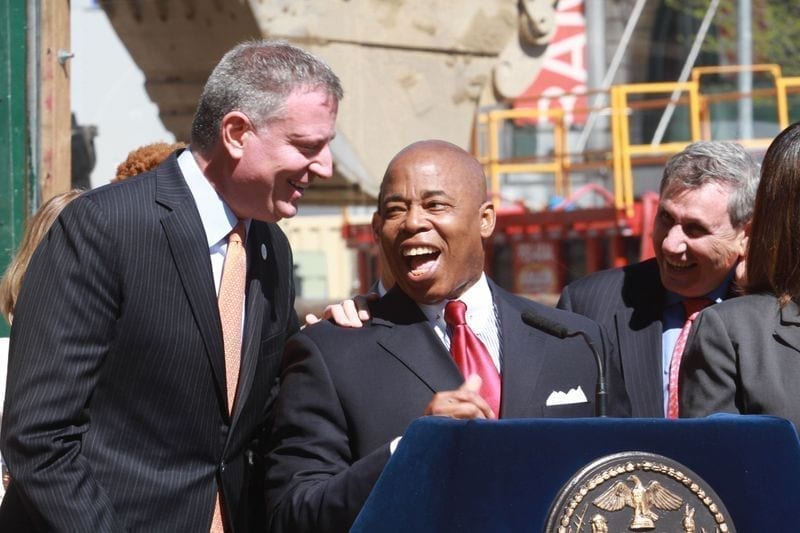Search Posts
Recent Posts
- To Boost the City’s Recovery, Get ‘Learning Leaders’ Back in School March 29, 2022
- For State’s Future, The Governor Must Say No Sometimes January 26, 2022
- A better deal for retirees and NYC: But the city made two mistakes with its Medicare Advantage Plus plan October 25, 2021
- Who Decides How Public Money Is Spent? October 15, 2021
- The lame duck and the hatchling: How to run the transition between Bill de Blasio and his successor July 5, 2021
Categories
Subscribe!
The lame duck and the hatchling: How to run the transition between Bill de Blasio and his successor

This post was written in collaboration with Norman Steisel
Although the determination of the results of the mayoral primary has gotten off to a chaotic start, we will still know the final outcome nearly six months before Mayor de Blasio’s successor is inaugurated in January. Yes, there is a general election to be held in November, and, as de Blasio pointed out in an appearance on “Inside City Hall,” anything can happen between now and then (the last few days certainly show how true that is!). Nonetheless, the odds are very strong that the winner of the Democratic primary will be the next mayor.
Six months is an inordinately long time to have both a new mayor-designate and a lame-duck mayor, especially in the fraught post-COVID circumstances the city confronts.
The long lag between primary and inauguration is occurring for the first time since 1973 because this is the first mayoral primary to occur following the 2019 change in the law by the Legislature and Gov. Cuomo that moved the local and state primary dates from September to coincide with the congressional primaries that have held in June since 2012. The consolidation was done to increase turnout and save the cost of holding two elections.
We are now facing a situation in which the new mayor and a City Council including more than two-thirds new members will be watching and waiting in the wings while the incumbents, having just finalized next year’s staggeringly large budget, have another six months to try to preserve and expand their policy and program choices. Those who are making the budgetary decisions now are doing so with the knowledge that they will not be accountable for the impact down the road.
We can and should be optimistic about the city’s economic future. But the length and nature of recovery is uncertain and current projections are that the next mayor and Council will be facing multi-billion-dollar deficits due to the overspending incorporated in the newly adopted fiscal year 2021-22 budget, which utilizes billions of dollars of federal recovery funding, much of it on new hiring and programs for which there is no ongoing revenue source.
Despite all the new headcount and programs created, the mayor has done next to nothing to come up with the $1 billion in labor savings he keeps promising or to achieve meaningful efficiencies in agency operations, nor are there any funds in the budget to cover potential new salary increases which may be required in all the public employee labor contracts that need to be negotiated.
If de Blasio works constructively with his successor, he can start to point policy in the right direction for the future. If he doesn’t, he’ll spend months trying to cement his own personal policy preferences, including plenty of things that will only be undone when the new mayor takes power.
Ironically, a similarly untenable situation used to exist at the presidential level because the United States Constitution originally specified that the presidential inauguration take place on March 4 in order to give winning candidates time to travel to Washington. But a great deal of mischief happened before the new president took over (i.e. seven states seceded before Lincoln’s inauguration); the 20th Amendment to the Constitution, sometimes called the Lame Duck Amendment, was adopted in 1933, moving the inauguration to Jan. 20 before FDR’s first term.
We respectfully disagree with Kathryn Garcia, who has said that there will be ample time to transition after the November election. There is too much time between now and then for irreversible decisions to tie the next mayor’s hands. Some ground rules and guidelines for co-existence between the outgoing and the likely incoming administration need to be established so that the incoming mayor is not unduly limited in pursuing his/her priorities.
De Blasio said in that “Inside City Hall” interview that he will cooperate fully to assure a smooth transition to the new mayor. The sooner the successor gets a pre-transition staff up and running to interact with the current administration the better. Garcia, Eric Adams and Maya Wiley should all be prepared to launch transition teams as soon as possible, as should the Republican nominee. As soon as the results are finalized on July 12, the current mayor needs to announce a plan for how his administration will brief and receive input from the Democratic and Republican nominees, make his commissioners available for briefings, etc.
This is uncharted territory and it can become a model for governmental transition in a democracy. Either that, or it will wind up being a cautionary tale.
This post was originally published on July 5th by the New York Daily News.